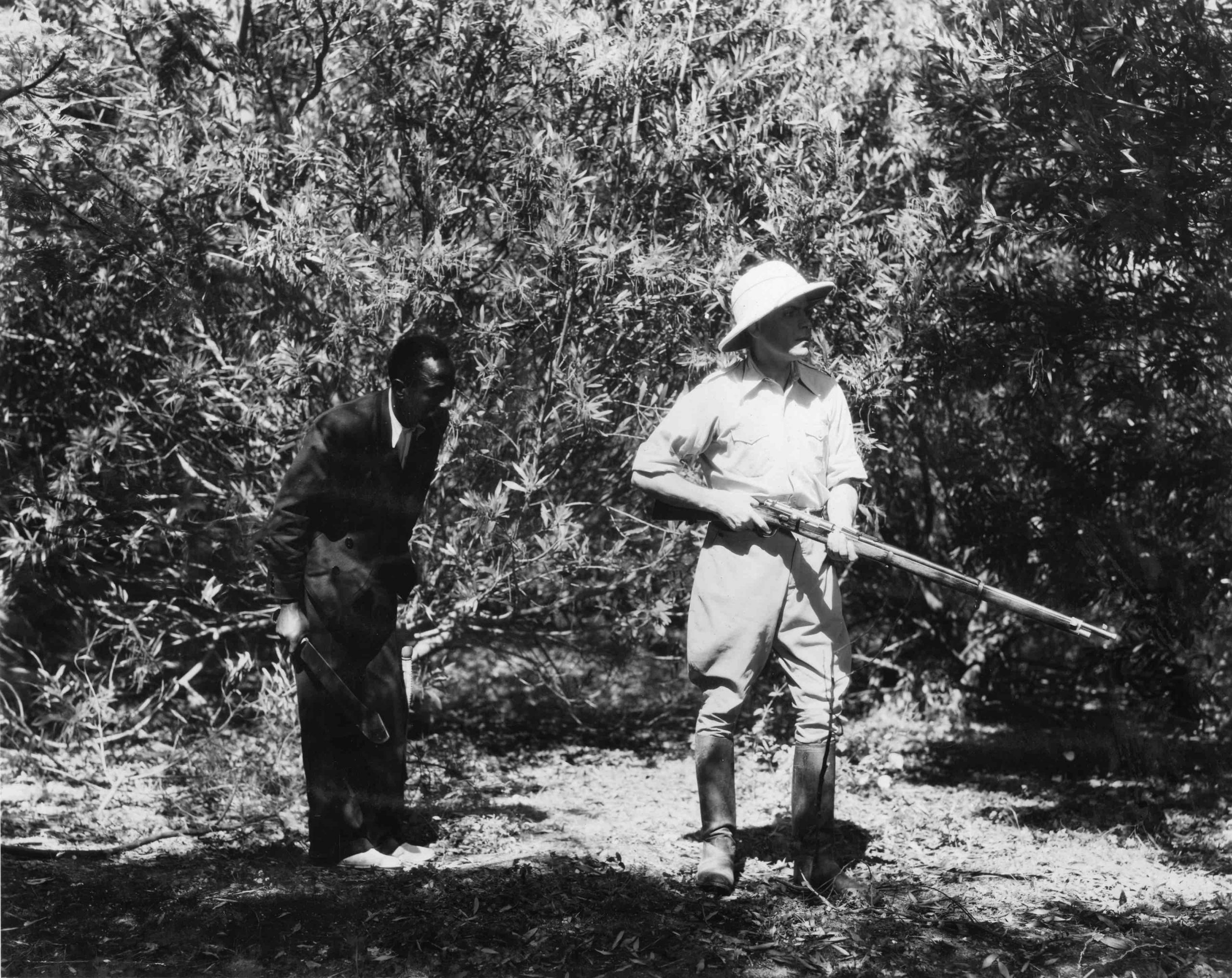Reimagine the Empire. (Anti-)Colonial Projections in Cinema
Module I
Reimagine the Empire. (Anti-)Colonial Projections in Cinema (Module I)
Feitiço do império. © Cinemateca Portuguesa
Info
Title
Reimagine the Empire. (Anti-)Colonial Projections in Cinema – Module I
Artist/Educator
Maria do Carmo Piçarra
Location
Zoom
Language
Portuguese
(scroll down for information in Portuguese)
Target Audience
Interested in the use of cinema by the Portuguese dictatorial regime and by the liberation movements and in the critical analysis of filmic representations and counter-representations relating to the former colonies and their inhabitants.
Limit Participants
20 participants
Start Date
October 7th, 2021
Duration
October 7th, 8th and 9th
Time
October 7th and 8th – 6 pm to 9 pm (Lisbon)
October 9th – 10:30 am to 1:30 pm (Lisbon)
Information
Subscription deadline
September 24th
Price
One Module – 75€
Two Module – 100€
About
The Estado Novo used cinema to impose, internally and externally, the image of a pluricontinental and multiracial country. Many ideas propagated were never questioned after the reestablishment of democracy and after the independence of Portuguese-speaking countries.
This free course will discuss how the propaganda – and censorship – of the Estado Novo determined the representations concerning Portuguese-speaking countries, including the cases of “Portuguese Asia”. It will also debate the evidences of the (im)possibility of another look at the former Portuguese colonies in works by Cinema Novo that were censored and banned, and will address the uses of cinema by different political movements during the liberation struggles in Africa.
• Class 1 – Overseas Blues. Pioneering colonial propaganda in films before World War II.
• Class 2 – Documentaries of political, industrial and tourist propaganda vs censorship at Novo Cinema about the colonies.
• Class 3 – The Catembe and Let me at least climb the palms…. Cinematographic internationalism and liberation movements: Sarah Maldoror and Augusta Conchiglia about Angola, the Cabralista project for Guinea/Cape Verde, and the struggle of Mozambique shown to the world.
Maria do Carmo Piçarra is a researcher at ICNOVA-FCSH and a professor at the Universidade Autónoma de Lisboa. With a doctorate, a master’s degree and a degree in Communication Sciences, she developed the post-doctoral research “‘ Cinema Império ’. Portugal, France and England, representations of the empire in cinema” (2013-2018), having, in this context, been a guest researcher at the CFAC-University of Reading. She is a film programmer and was deputy chairman of the Institute of Cinema, Audiovisual and Multimedia (1998-1999).
She has published, among other books and articles, Azuis Ultramarinos. Colonial advertising and censorship in the cinema of the Estado Novo” (2015), and coordinated, with Jorge António, the trilogy Angola, the birth of a nation (2013, 2014, 2015) and, with Teresa Castro, (Re)Imagining African Independence. Film, Visual Arts and the Fall of the Portuguese Empire (2017). She has just published the chapter “Resistance and political awareness through the poetic gaze of Sarah Maldoror” in the book Contemporary lusophone African film (Paulo de Medeiros and Livia Apa, 2020). It animates Aleph – Network for Action and Critical Investigation of Colonial Image.
Informações
Título
Re-imaginar o Império. Projecções (Anti-)Coloniais no Cinema – Módulo I
Artista/Educador
Maria do Carmo Piçarra
Local
Zoom
Idioma
Português
Público-alvo
Interessados no uso do cinema pelo regime ditatorial português e pelos movimentos de libertação e na análise crítica das representações e contra-representações fílmicas relativas às ex-colónias e seus habitantes.
Limite de participants
20 participantes
Início
7 de Outubro, 2021
Duração
7, 8 e 9 de Outubro
Horário
7 e 8 de Outubro das 18h às 21h (Lisboa)
9 de Outubro das 10h30 às 13h30 (Lisboa)
Informação
Prazo de inscrição
24 de Setembro
Preço
Um Módulo – 75€
Dois Módulos – 100€
Sobre
O Estado Novo usou o cinema para impor, interna e externamente, a imagem de um país pluricontinental e multirracial. Muitas ideias propagadas nunca foram questionadas após o restabelecimento da democracia e após as independências dos países de língua portuguesa.
Este curso livre discutirá como é que a propaganda – e a censura – do Estado Novo determinou as representações relativas aos países de língua portuguesa, incluindo os casos da “Ásia Portuguesa”. Debaterá ainda as evidências da (im)possibilidade de um outro olhar sobre as ex-colónias portuguesas em obras de autor do Cinema Novo que foram censuradas e proibidas e abordará os usos do cinema pelos diferentes movimentos políticos, durante as lutas de libertação em África.
• Aula 1 – Azuis ultramarinos. Pioneirismo na propaganda colonial nos filmes antes da II Guerra Mundial.
• Aula 2 – Documentários de propaganda política, industrial e turística vs censura no Novo Cinema sobre as colónias.
• Aula 3 – Os casos Catembe e Deixem-me ao menos subir às palmeiras…. Internacionalismo cinematográfico e movimentos de libertação: Sarah Maldoror e Augusta Conchiglia sobre Angola, o projecto cabralista para a Guiné/Cabo-Verde, e a luta de Moçambique mostrada ao mundo.
Maria do Carmo Piçarra é investigadora integrada no ICNOVA-FCSH e professora na Universidade Autónoma de Lisboa. Doutorada, mestre e licenciada em Ciências da Comunicação, desenvolveu a investigação pós-doutoral “‘Cinema Império’. Portugal, França e Inglaterra, representações do império no cinema” (2013-2018), tendo, nesse âmbito, sido investigadora convidada do CFAC-University of Reading. É programadora de cinema e foi adjunta da presidência do Instituto de Cinema, Audiovisual e Multimédia (1998-1999).
Publicou, entre outros livros e artigos, Azuis ultramarinos. Propaganda colonial e censura no cinema do Estado Novo” (2015), e coordenou, com Jorge António, a trilogia Angola, o nascimento de uma nação (2013, 2014, 2015) e, com Teresa Castro, (Re)Imagining African Independence. Film, Visual Arts and the Fall of the Portuguese Empire (2017). Acaba de publicar o capítulo “Resistance and political awareness through the poetic gaze of Sarah Maldoror” no livro Contemporary lusophone African film (Paulo de Medeiros e Livia Apa, 2020). Dinamiza a Aleph – Rede de Acção e Investigação Crítica da Imagem Colonial.

